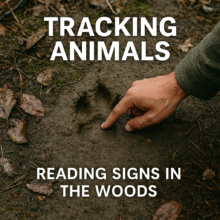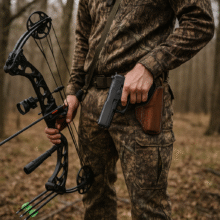Summer Hunts: Navigating the Off-Season for Year-Round Hunting Adventures

Welcome to the definitive guide to summer hunting, where we explore the untapped potential of the off-season to offer hunters year-round excitement and challenges. Far from being a time to stow away your gear, summer presents a unique set of opportunities for personal growth, adventure, and contribution to wildlife management and conservation. This comprehensive exploration will guide you through everything from identifying target species and preparing effectively, to ensuring safety and ethical considerations in the heat, and maximizing the benefits of your summer hunting expeditions.
Table of Contents
Introduction
The off-season in hunting typically signifies a pause, a breath in the year where the forests and fields fall quiet from the calls and shots of hunters. Yet, this period, especially summer, is far from a dormant time for those who know where to look. It’s a season ripe with opportunities for adventure, skill enhancement, and the deepening of our connection to the natural world. This guide aims to redefine the off-season, turning it into a period of active engagement and discovery.
Unlocking Summer Hunting Opportunities
Diverse Species to Target
Summer hunting shifts the focus from more traditional game to a variety of species that offer unique challenges and benefits:
- Predators and Varmints: Engaging with coyotes, foxes, and bobcats, not only tests your stalking and shooting skills but also aids in controlling populations that can impact local fauna.
- Feral Hogs: With their year-round presence and destructive nature, hunting feral hogs during summer can provide thrilling hunts while contributing to environmental conservation efforts.
- Small Game and Birds: Rabbit, squirrel, and certain bird species like doves offer excellent opportunities for beginners to learn and for seasoned hunters to practice their precision and patience.
Unveiling the Benefits of Summer Hunting
Summer hunting isn’t just about the thrill of the chase; it’s a multifaceted experience that offers:
- Skill Advancement: The off-season is the perfect time to refine techniques, from tracking to shooting, in a less pressured environment.
- Conservation Efforts: Many summer hunting targets are part of control measures to maintain ecological balance, making your hunting trips doubly beneficial.
- Personal Growth: The challenges of summer hunting, from dealing with the heat to mastering new prey, foster resilience and adaptability.
Preparation: The Foundation of Success
Essential Gear for the Summer Hunter
The right equipment is crucial for a successful and enjoyable summer hunt:
- Appropriate Apparel: Invest in lightweight, breathable clothing designed for high temperatures and robust sun protection gear, including wide-brimmed hats and UV-blocking sunglasses.
- Hydration Solutions: A reliable hydration system, whether bottles or a bladder pack, is non-negotiable to prevent dehydration.
- Navigation Tools: With the dense foliage and longer days, a good GPS device or map and compass are essential for navigating your hunting grounds.
Mastering Scouting and Strategy
The summer landscape requires a different approach to scouting and strategy:
- Utilize Technology: Modern trail cameras and apps can provide invaluable insights into animal movements and behavior patterns during the warmer months.
- Learn the Land: Spend time understanding the terrain, water sources, and shade areas, as these will heavily influence animal and bird activity in summer.
Combatting the Summer Heat: Safety Tips
The summer heat adds a layer of complexity to hunting safety:
- Early Morning or Late Evening Hunts: Plan your activities to avoid the peak heat of midday.
- Know the Signs of Heat-Related Illnesses: Familiarize yourself with the symptoms of heat exhaustion and heat stroke, and know how to respond if they arise.
Upholding Hunting Ethics in High Temperatures
Ethical hunting practices are especially critical in summer:
- Quick, Clean Kills: Ensure your skills are honed to make ethical shots, minimizing animal suffering and meat spoilage.
- Respect for Nature: Be mindful of the increased fire risk in summer and practice Leave No Trace principles to preserve the natural habitat.
Enhancing Your Hunting Journey During Summer
Elevating Skills and Experience
The off-season is an ideal time for personal development:
- Experiment with New Equipment: Test out that new rifle, bow, or camouflage pattern you’ve been eyeing.
- Practice Makes Perfect: Use this time to improve your marksmanship, tracking, and camouflage skills.
Fostering Community Engagement and Conservation
Summer offers great opportunities to connect with fellow hunters and contribute to conservation efforts:
- Join Conservation Projects: Participate in local habitat restoration projects or invasive species control efforts.
- Engage in Hunter Education: Share your knowledge with new hunters or take advantage of educational opportunities to expand your own skills.
Frequently Asked Questions
1. What species are best to hunt during the summer?
During the summer, hunters often focus on species such as varmints (e.g., coyotes, prairie dogs), invasive species like feral hogs, and small game including rabbits and squirrels. These species offer unique challenges and help in controlling populations that can be detrimental to local ecosystems.
2. How do I stay safe while hunting in the heat?
To ensure safety during summer hunts, it’s crucial to stay hydrated, wear lightweight and breathable clothing, hunt during the cooler parts of the day (early morning or late evening), and be aware of the signs of heat-related illnesses such as heat exhaustion and heat stroke.
3. Are there any specific gear recommendations for summer hunting?
For summer hunting, essential gear includes lightweight and moisture-wicking clothing, a hydration pack or water bottles, sun protection (hat, sunglasses, sunscreen), and a good pair of lightweight boots that offer both comfort and support. Additionally, consider a lightweight and breathable vest or pack to carry essentials without overheating.
4. How can summer hunting benefit wildlife management and conservation?
Summer hunting, especially of species like feral hogs and certain varmints, plays a crucial role in wildlife management by controlling populations that can cause significant ecological damage. It helps maintain balance in ecosystems, reduces crop and property damage, and supports biodiversity.
5. What are some ethical considerations for summer hunting?
Ethical considerations for summer hunting include ensuring quick and humane kills to prevent unnecessary suffering, being mindful of the potential for faster spoilage of meat due to the heat, and practicing Leave No Trace principles to minimize impact on natural habitats. It’s also important to adhere to local regulations and seasonal restrictions to support sustainable hunting practices.
Conclusion
Summer hunting opens up a world of opportunities for those willing to embrace the off-season. It’s a time for adventure, skill-building, and giving back to the ecosystems we cherish. By preparing adequately, practicing safety and ethics, and engaging with the hunting community, you can transform the summer months into an enriching extension of your hunting passion. The off-season is merely a concept; for the avid hunter, the pursuit never ends.
Happy hunting, and may your summer adventures be fruitful and fulfilling!







